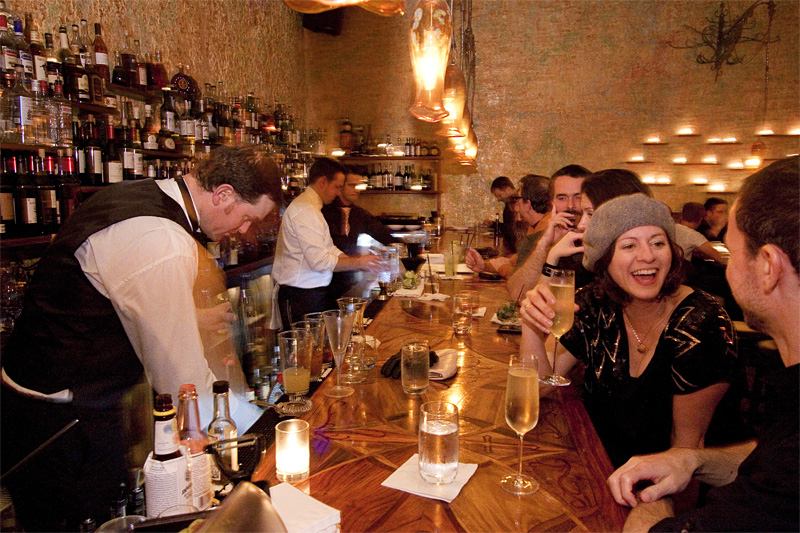My friend and I had checked in with the organizers and slipped into our seats. Now we were trying to figure out what the menu was, let alone which of Portalis Wine Shop’s hundreds of wines we should drink with it. “Any interest in splitting a bottle with us?” the pair seated next to us asked. We had just learned their names.
That’s the point of Vagabond, one of the recent crop of “underground” Seattle restaurants—invitation-only events that may be legal or illegal, depending on the venue, but are never about just the food.
Last October, the media received e-mail press releases stating that the founders of Gypsy, Seattle’s most well-known illegal restaurant, were joining forces with Michael Hebberoy, who had parlayed a nationally recognized underground restaurant in Portland into three legal bistros before leaving it all behind in a divorce and quitting Portland for Seattle. These two august unrestaurateurs, the statements read, were going to start Vagabond, a Monday-night communal dinner at Ballard’s Portalis Wine Shop. Vagabond wouldn’t require Gypsy’s three-step application process, and would create a more down-to-earth, affordable experience. But as soon as we in the media had printed word of the launch, we got a blast e-mail from Hebberoy saying that he was not, in fact, associated with Vagabond. He was starting his own underground restaurant, One Pot, holding events several times a month. Its theme, identical to Vagabond’s, was that all the diners would eat from the same communal pot.
Since I was as curious about Vagabond and One Pot as I was confused over their origins, I decided to wait a while to see how things panned out. The buzz that filtered back to me over the following months suggested that both “restaurants” had settled into their respective grooves. Eventually, I signed up (anonymously) for each event’s e-mail mailing list and waited…and waited…until a space opened up.
The invitation to Vagabond came through first a few months back. On a Monday night, when the wine shop was closed, the owners pushed together the tables in the front. Once we were all seated, “Head Vagabond” Gabriel Claycamp, owner of the cooking school Culinary Communion, came out and introduced the night’s chef, Tyler Hefford-Anderson, who just opened Opal on Queen Anne. Hefford-Anderson recited the menu: perhaps a little foie gras to start, then his take on vichyssoise, pork belly with potatoes à la Joël Robuchon, and grilled French toast to finish. T and I let our tablemates, who’d been talking with the Portalis staff before we arrived, pick wines to match. Then the feeding began.
Though I smelled seared foie fat coming out of the kitchen, the chefs evidently decided that they needed it more than we did, so we started out with a potato-leek zvichyssoise that had been pureed with yellow bell pepper, a shock of summer sunlight to light up the cream, counteracted with a few crumbles of aged Humboldt Fog goat cheese. A while later, the waiters dropped off decadence-on-a-platter: Braised pork belly, sweet-glazed and then roasted, with a second platter of mashed potatoes. “The traditional ratio of potatoes to butter and cream in Potatoes Robuchon is 50-50,” explained Hefford-Anderson before the meal, eliciting a few moans—whether of pleasure or horror wasn’t clear. The potatoes had the consistency of ice cream, and let me tell you, you could taste every ounce of the fat. Both offerings were so rich that I only needed a few bites.
We drank, and ate, and talked, and drank some more, ordering a second bottle of wine to match the pork. Almost all the people sitting around me had some connection to the restaurant industry or had graduated to advanced levels of foodiedom (the kind where you collect four-star menus like 10-year-olds collect baseball cards). By the time the dessert came around, everyone’s face was flushed with wine. Which turned out to be a good thing. Prior to the meal, the chef had told us all, “Ever wondered why no one grills French toast?” Because that would taste awful, I thought to myself, and the scorched, slightly sodden egg-dipped bread proved me right. But one of the women at our table bought us all a couple of bottles of port to share, and that proved dessert enough.
It took me another two months to score an available slot at One Pot, since Hebberoy only holds five or so a month. Unlike Claycamp, who organizes the meals around a chef or chefs, Hebberoy organizes around a concept or a person. His dinners hop from place to place, most often a bar or a restaurant, and Hebberoy has the star power to attract documentary makers, authors, and celebrity chefs. Most sell out weeks in advance.
Which didn’t take away from the improvised, casual feel of the meal I attended. A friend and I walked to Volunteer Park Cafe, One Pot’s host for the evening, to find a handful of people standing around sipping wine. We added a couple glasses to our tab and basked in the warm evening. It took 45 minutes for Nina Planck, Real Food author and guest of honor, to arrive, and another 30 minutes for everyone to find their places for the speeches to begin.
While Claycamp had simply thanked the chef and retired to eat, One Pot’s master of ceremonies laid out the schedule: Appetizer. Interview with Planck. Entrées. Questions and discussion. Dessert. Conversation.
Conversation about food and farming began, filled, and ended the meal, which wasn’t much of a stretch for the diners, because once again there seemed to be a surfeit of food-biz people. Though most of us hadn’t read Planck’s book, she explained enough of her thesis—that despite what we’ve been told, “real foods” such as raw milk and home-rendered lard have significant nutritional benefits—to spark more dialogue. I had been warned by a number of people who’ve attended One Pot dinners that the speechifying can descend into high rhetoric (check out One Pot’s Web site for an example) but Planck cut off any such language.
And Ericka Burke’s food turned out to be the perfect illustration of everything Planck advocates. The Volunteer Park Cafe’s chef (the café recently began serving dinner, by the way) told us that she was given a few boxes of products from the farmers Hebberoy recruited, which she then Iron Chef’d into an elegant farmhouse meal. There was a bruschetta with a creamy Idaho raw goat’s milk cheese, blended with a little anise and lavender and covered with zucchini sautéed with fresh mint. There was a salad of fresher-than-fresh greens and a squash blossom fritter filled with anchovy-spiked mozzarella.
After the first conversation break, the waiters brought over a cast-iron Dutch oven containing a soupy broth with braised brisket falling apart into long strands. It tasted exactly like my mother’s best beef stew, the one I used to request for my birthday. Our One Pot was accompanied by a platter of sautéed baby carrots and creamed cabbage with fatback, which was as fantastic as the description sounds.
I used a flaky biscuit, of course made with lard, to sop up the beef juices, slathering golden raw-milk butter on top, and later slopped an extra spoonful of raw-milk whipped cream onto a slice of lemon bundt cake served with a compote of fresh berries. I’m not sure I completely fall in step with Planck’s argument, but to feel entirely absolved of guilt over such a good meal made its $75 price tag worth it.
When I spoke to Claycamp last week, he explained that he and Hebberoy parted ways because they couldn’t both make a profit working together on Vagabond. It makes sense, given that Portalis can only hold 45 people. (To increase the frequency of his events, Claycamp’s going to introduce another location this fall.)
But there are philosophical differences, too. Vagabond celebrates the unfettered pleasures of the table, One Pot the pleasure of ideals. As with any hipster event, there was a bit of self-congratulation in being there, but it was overshadowed by shared passion for food. Furthermore, by defining their events as communal meals, both Claycamp and Hebberoy make sure everyone comes in expecting to talk to strangers. It’s the most unrestaurantlike—and most welcome—service they could provide.






